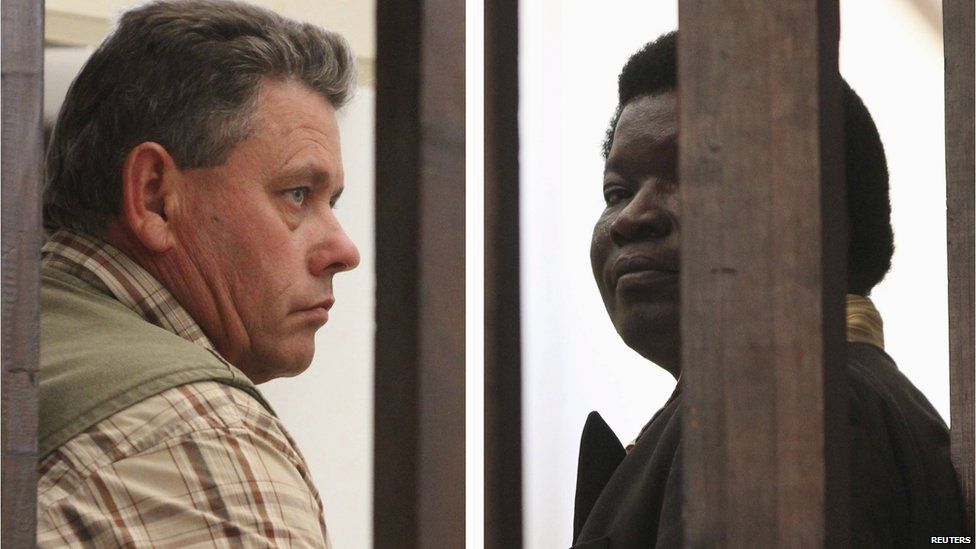Cecil the lion: Zimbabwe hunter bailed over killing
- Published

A hunter accused of helping a US tourist kill Zimbabwe's most famous lion has been released on bail.
Theo Bronkhorst pleaded not guilty to a charge of "failing to prevent an unlawful hunt". He was granted bail of $1,000 (£638) and ordered to appear in court again on 5 August.
His co-accused - farm owner Honest Ndlovu - will appear at a later date.
Walter Palmer, the US dentist who shot the animal known as Cecil, has left Zimbabwe but could also face charges.
Mr Palmer said he paid for the hunt, but was not aware of the lion's identity.
He said he regretted shooting the animal, and believed he was on a legal hunt. He had relied on professional guides to find a lion and obtain the necessary permits, he added.
Mr Bronkhorst and Mr Ndlovu could face up to 15 years in prison if found guilty.
Cecil is believed to have died on 1 July, but the carcass was not discovered until a few days later.
Mr Palmer is said to have shot and injured the animal with a bow and arrow. The group did not find the wounded lion until 40 hours later, when he was shot dead with a gun.
'An activity I love'
Separately, court records have shown that Mr Palmer has a felony record in the US after killing a black bear in the state of Wisconsin in 2006.
The dentist was given a one-year probation and fined $3,000, having shot the creature outside an authorised zone and then tried to pass it off as having been killed elsewhere.
The American tourist is believed to have paid about $50,000 to go on the hunt in Zimbabwe.
More than 400,000 people have signed an online "Justice for Cecil" petition, calling on Zimbabwe's government to stop issuing hunting permits for endangered animals.
Mr Palmer insists that he believed his guides had secured "all proper permits" for the hunt.
"I relied on the expertise of my local professional guides to ensure a legal hunt," he said in a statement on Tuesday.
"I deeply regret that my pursuit of an activity I love and practice responsibly and legally resulted in the taking of this lion."
He said he had not been contacted by authorities in Zimbabwe or the US but would "assist them in any inquiries they may have".
The dentist is believed to be back in the US, although his exact whereabouts are unknown.
His dental practice in Bloomington, Minnesota has been temporarily closed and a note placed on the door referring visitors to a public relations firm. A protest is due to be held outside the building later.
The firm's social media accounts have also been disabled, after they were flooded with messages from angry members of the public.
Cecil the lion
- A major tourist attraction in Hwange National Park - Zimbabwe's largest game reserve
- The 13-year-old animal was renowned for being friendly towards visitors
- Recognisable because of his large size and distinctive black mane
- Led two prides containing six lionesses and 12 cubs along with another lion, Jericho
- Was being monitored as part of an Oxford University study into lion conservation
Night-time pursuit
Cecil the lion was skinned and beheaded, according to the Zimbabwe Conservation Task Force (ZCTF), a local charity.
The ZCTF said the hunters had used bait to lure him outside Hwange National Park during a night-time pursuit.
Lions in Africa
35,000
Max estimated lion population
12,000
Max lion population in southern Africa
-
665 Approx number of 'trophy' lions killed for export from Africa per year
-
49 Lion 'trophies' exported from Zimbabwe in 2013
-
0.29% Contribution to GDP of Zimbabwe from trophy hunting
-
17% Of Zimbabwe's land given to trophy hunting
The animal had a GPS collar fitted for a research project by UK-based Oxford University that allowed authorities to track its movements. The hunters had tried to destroy it but failed, according to the ZCTF.
On Monday, the head of the ZCTF told the BBC that Cecil "never bothered anybody" and was "one of the most beautiful animals to look at".
- Published29 July 2015
- Published18 March 2015
- Published5 December 2012
- Published25 May 2015